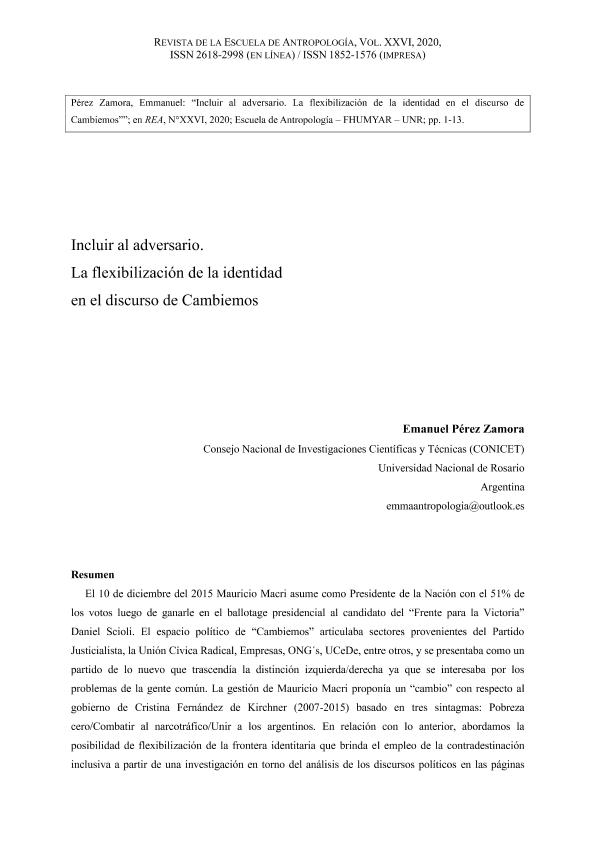Mostrar el registro sencillo del ítem
dc.contributor.author
Perez Zamora, Emmanuel Antonio

dc.date.available
2022-04-01T15:16:24Z
dc.date.issued
2020-04-30
dc.identifier.citation
Perez Zamora, Emmanuel Antonio; Incluir al adversario: La flexibilización de la identidad en el discurso de Cambiemos; Universidad Nacional de Rosario. Facultad de Humanidades y Artes. Escuela de Antropología; Revista de la Escuela de Antropología; XXVI; 30-4-2020; 1-13
dc.identifier.issn
1852-1576
dc.identifier.uri
http://hdl.handle.net/11336/154179
dc.description.abstract
El 10 de diciembre del 2015 Mauricio Macri asume como Presidente de la Nación con el 51% de los votos luego de ganarle en el ballotage presidencial al candidato del “Frente para la Victoria” Daniel Scioli. El espacio político de “Cambiemos” articulaba sectores provenientes del Partido Justicialista, la Unión Cívica Radical, Empresas, ONG´s, UCeDe, entre otros, y se presentaba como un partido de lo nuevo que trascendía la distinción izquierda/derecha ya que se interesaba por los problemas de la gente común. La gestión de Mauricio Macri proponía un “cambio” con respecto al gobierno de Cristina Fernández de Kirchner (2007-2015) basado en tres sintagmas: Pobreza cero/Combatir al narcotráfico/Unir a los argentinos. En relación con lo anterior, abordamos la posibilidad de flexibilización de la frontera identitaria que brinda el empleo de la contradestinación inclusiva a partir de una investigación en torno del análisis de los discursos políticos en las páginas oficiales de Facebook de Mauricio Macri y de Daniel Scioli durante el período de ballotage presidencial del año 2015. Para ello, hacemos uso de la caja de herramientas que nos ofrece la articulación entre el enfoque polifónico-argumentativo del discurso político y el análisis político del discurso.
dc.description.abstract
On December 10, 2015 Mauricio Macri assumes as President of the Argentina with 51% of the votes after winning in the presidential ballotage to the candidate Daniel Scioli of the “Frente para la Victoria”. The political space of “Cambiemos” articulated sectors coming of the Justicialist Party, Radical Civic Union, CEO´s, ONG´s, UCeDe, among others, and shows up a Party of the new that trascended the left/right cleavage since it was interested in the problems of the ordinary argentinean people. The managment of Mauricio Macri propose a change with respect to government of Cristina Fernández de Kirchner (2007-2015) based on three phrases: Zero poverty/Fight drug trafficking/Uniting Argentines. In relation to the above, we address the possibility of easing the identity frontier offered by the use of inclusive counterdestination from an investigation around the analysis of political speeches in the official Facebook pages of Mauricio Macri and Daniel Scioli during the presidential ballotage period of 2015. To do this, we use the toolbox that offers us the articulation between the polyphonic-argumentative approach to political discourse and the political analysis of discourse.
dc.format
application/pdf
dc.language.iso
spa
dc.publisher
Universidad Nacional de Rosario. Facultad de Humanidades y Artes. Escuela de Antropología
dc.rights
info:eu-repo/semantics/openAccess
dc.rights.uri
https://creativecommons.org/licenses/by-nc/2.5/ar/
dc.subject
DISCURSO POLÍTICO
dc.subject
CAMBIEMOS
dc.subject
MAURICIO MACRI
dc.subject
CONTRADESTINACIÓN INCLUSIVA
dc.subject.classification
Sociología

dc.subject.classification
Sociología

dc.subject.classification
CIENCIAS SOCIALES

dc.title
Incluir al adversario: La flexibilización de la identidad en el discurso de Cambiemos
dc.title
Include the adversary: The flexibilization of identity in the discourse of Let’s Change
dc.type
info:eu-repo/semantics/article
dc.type
info:ar-repo/semantics/artículo
dc.type
info:eu-repo/semantics/publishedVersion
dc.date.updated
2022-03-16T12:39:05Z
dc.identifier.eissn
2618-2998
dc.journal.number
XXVI
dc.journal.pagination
1-13
dc.journal.pais
Argentina

dc.journal.ciudad
Rosario
dc.description.fil
Fil: Perez Zamora, Emmanuel Antonio. Universidad Nacional de Rosario. Facultad de Ciencias Políticas y Relaciones Internacionales. Instituto de Investigaciones. Centro de Investigaciones en Mediatizaciones; Argentina. Consejo Nacional de Investigaciones Científicas y Técnicas. Centro Científico Tecnológico Conicet - Rosario; Argentina
dc.journal.title
Revista de la Escuela de Antropología
dc.relation.alternativeid
info:eu-repo/semantics/altIdentifier/url/https://revistadeantropologia.unr.edu.ar/index.php/revistadeantropologia/article/view/111
dc.relation.alternativeid
info:eu-repo/semantics/altIdentifier/doi/https://doi.org/10.35305/revistadeantropologia.v0iXXI.111
Archivos asociados
